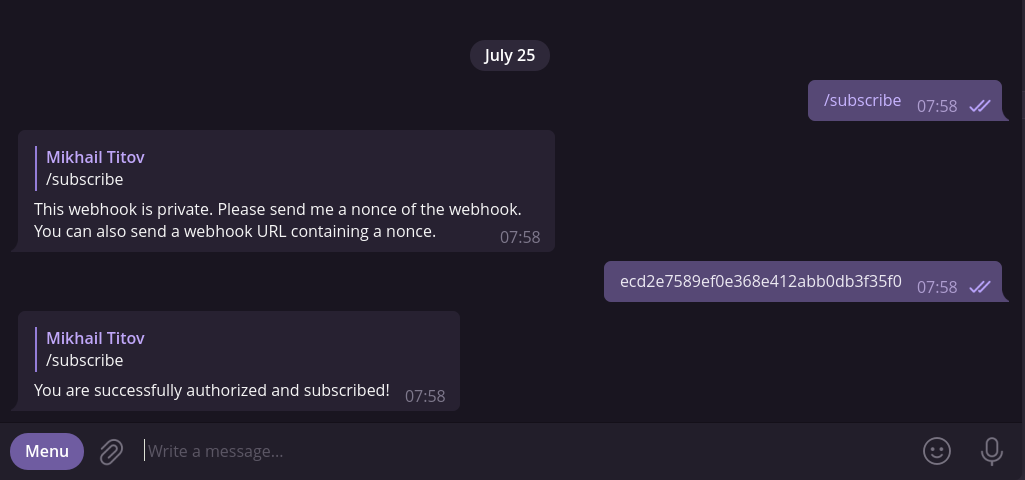Webhooks over Telegram (WoT)
⚠ This project is currently being migrated over the new stack. The main branch is completely unstable and which builds are, probably, even not working.
WoT aims to provide a simple API for registering webhooks and sending messages to Telegram chats via them
using a single secret URL.
Just like in Discord or Slack. You simply POST a message to chats:
POST https://wot.example.com/<nonce>
Content-Type: application/json
Authorization: auth token
{
"content": {
"sources": [
{
"type": "REGULAR",
"value": "Hello, world!",
"subsources": []
}
]
}
}Table of contents
Features
- Easy-to-use RESTful API
- Simple authorization
- Simple subscribing and unsubscribing process
- Multiple webhooks support
- Formatting support
- Attachments support (WIP)
- Kotlin library for WoT
- Spring Boot starter that autoconfigures the Kotlin library for WoT
- Automatic payload mapping from other services (WIP)
Running
To run the server you should have Java 17+ and Docker Compose installed.
Build the image:
./gradlew wot-server:bootBuildImageEdit the docker-compose.yml file and configure the secret key used for authorization:
# ./wot-server/docker/docker-compose.yml
# ...
services:
# ...
wot-server:
# ...
environment:
# ...
SIMPLE_SECURITY_AUTHENTICATION_SECRET: my_secret_key
# ...
# ...
# ...
# ...Run the containers:
docker-compose -f ./wot-server/docker/docker-compose.yml up -dUsage
Let's start with creating a webhook:
POST https://localhost:9696/api/webhooks
Content-Type: application/json
Authorization: ...
{
"name": "my-webhook",
"botToken": "your bot token",
"private": true,
"targets": []
}Now open the Telegram bot with which the webhook is bound and send /subscribe.
Since this webhook is marked as private, we have to send its nonce which we got in the response.
Well, let's send a message now:
POST https://localhost:9696/<webhook nonce>
Content-Type: application/json
{
"content": {
"sources": [
{
"type": "REGULAR",
"value": "Hello, world!",
"subsources": []
}
]
}
}Authorization
Each request to /api/** path must include a secret key within the Authorization header.
See Running for more info.
Libraries
- wot-client: WoT API client for Kotlin.
License
Copyright 2022 Webhooks over Telegram project contributors
Licensed under the Apache License, Version 2.0 (the "License");
you may not use this file except in compliance with the License.
You may obtain a copy of the License at
https://www.apache.org/licenses/LICENSE-2.0
Unless required by applicable law or agreed to in writing, software
distributed under the License is distributed on an "AS IS" BASIS,
WITHOUT WARRANTIES OR CONDITIONS OF ANY KIND, either express or implied.
See the License for the specific language governing permissions and
limitations under the License.


